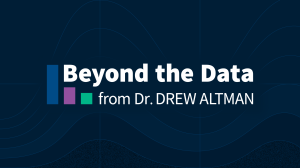Countering Health Misinformation, By the Numbers
 Health misinformation is everywhere, now fueled by AI. But much of the public isn’t fully buying it. And like voting, there is a big group in the middle that is up for grabs.
Health misinformation is everywhere, now fueled by AI. But much of the public isn’t fully buying it. And like voting, there is a big group in the middle that is up for grabs.
Most Americans say they have heard various examples of health misinformation—about Covid vaccines, or reproductive health, or gun violence—but a much smaller share say they actually believe it.
Consider two examples:
- 65% of the public have heard false claims that Covid vaccines have caused thousands of deaths, but 10% believe this is definitely true.
- 49% have heard false claims that most gun homicides are gang related but just 9% say this is definitely true.
Most people are in a muddled middle, unsure whether these kinds of claims are true or not.
The believers tend to be less educated, rural, and Republican.
Misinformation is like American politics: There is a large group of “swing voters,” who at least in principle can be reached with reliable information. They say they trust doctors, local news and national news the most. They don’t trust social media much as a source of information but at the same time, many of them do say they regularly turn to social media for news.
Yes, but: Confusion can also lead to inaction. When people are unsure what is true, they may not take actions that health professionals would like them to take, such as getting the latest Covid booster. And misinformation is tricky terrain far more challenging than fact checking: One group’s outright falsehood can be another group’s strongly held belief even if they saw it on some fringe social media platform and it’s totally misguided. The misinformation case is always strongest when it’s built around claims that are clearly false.
At KFF, we’re looking at these issues and developing a new program area on Health Misinformation and Trust, which we’ll launch next year. It will be our fifth program area along with Policy Analysis, Polling and Survey Research, Social Impact Media, and KFF Health News, and the first program that we’ve added in over a decade. We plan to document what health misinformation is out there and where it is coming from in as close to real time as possible; publish regular updates to a new tracking poll to determine how misinformation is affecting the public, and especially vulnerable groups, in order to help those working to counter misinformation better target their efforts; and, investigate who is behind misinformation and why through a new investigative desk at our news service, among many other activities. We hope to work with partners.
One idea that jumps out to me from our pilot survey is pretty obvious: As is often the case, it’s one of those program ideas that is easier to conceptualize than execute. Our survey (and others) shows clearly that doctors and local TV news are among the most trusted sources of health information. So, it might make sense to mobilize local TV stations to feature their own local doctors trained in health misinformation to appear regularly, providing the facts on key health issues and countering mis and disinformation. We know that local audiences love health information almost as much as the weather. At scale, it would constitute a national network of locally based trusted messengers providing a counterweight to health misinformation.
